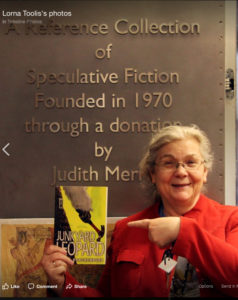A tricky subject
There’s a reason I’ve left the subject of marketing and promotion to one of the last articles on the subject of writers’ craft: it’s a tricky and often highly individual decision, dependent on personal preference, budget, and influence. I don’t think there’s any one perfect strategy. Sure, there are alleged experts who are going to sell you there version of the holy grail of marketing. But I’ve been at this for 40 years, not just in literary arts, but as a business partner in the home renovation industry, and having experience in both the construction and arts, I can assure you marketing is essentially a crap shoot.
So, should you market?
Well, yes. Because even though there’s no one perfect strategy for marketing, the flip side of that is no one will buy your widget if they don’t know you have a widget for sale. So, when devising your marketing strategy, it’s important to understand what makes up your market. Who is interested in what you have to sell? What age group? What income bracket? What related interests? What geographic region? All of that goes into the mix.
But what avenue to choose?
Certainly today there are myriad choices available. Myself, I opt for what’s going to cost me the least, allow me the greatest exposure to my target market, and take up the least amount of time and effort on my part. Allow me to list some of the tools in my belt:
Website
I think this is an essential tool in this age of global telecommunication. The website should be clean, optimized to operate across all platforms (desktop, tablet, mobile), an user friendly. However, having your own website is another whole world to explore and learn, and can be fraught with unexpected frustrations, like when your site gets hacked, or spammers discover you’re a target, and the way to deal with any of that is by dumping a another load of cash into apps and services to protect your site. After awhile you start asking yourself, just how economically sound is having a website? Am I actually selling more because I have a website? And with 4 million books published last year worldwide, you start to realize your voice is just one very small blip in the noise of our universe.
And aside from having a blog and putting out blasts of periodic pontification, news and features, are you then going to use your website as a shopping portal? Ecommerce, anyone? And then what kind of secure payment gateway to use?
You see what I mean?
But even so, despite the funds I plough into this website to keep it secure and free of hackers and spammers, little say the lack of sales through the site, I still think it’s an important tool. That’s why I keep it going. Should you? Only you can answer that.
For what it’s worth, I use WordPress, host through GoDaddy, and use PayPal for my payment gateway. I run a theme called Tilt, which I like because of its ability to allow me lots of diversity. I don’t allow unmoderated comments on my blog. I also pay for a security system through GoDaddy. After my initial sticker shock, I was pleased because the hackers and spammers pretty much disappeared. Previous to that I was getting hacked on a regular basis, and spammers were hitting the site on a daily basis.
Reviews
I would say gaining reviews, and reader awareness through reviews, is a good idea, because if nothing else it boosts your signal. So, best and easiest is to offer ARCS (advance review copies) or freebies to people and writers you know of influence from whom you can beg a favour. It also helps if those individuals have some influence in the genre in which you’re writing, which hopefully is an obvious sort of statement. And then take those positive reviews, or at least steal a few positive key phrases, and use them on jacket promotion, interior reviews, on your website, blog, social media, and so and thus.
I have regularly used LibraryThing‘s Early Reviewer program to garner reviews. Helps somewhat. But you do have to bear in mind you often get pretty stupid, ill-considered reviews whether good or bad. Helpful things like: this book sucked; or equally helpful: this book was great. Having said that, there are some very good reviewers on the site, individuals who post their intelligent, considered reviews not only on LibraryThing, but Goodreads (which is owned by Amazon now), Amazon, and other bookseller sites.
If you can manage it, only send out digital copies. Saves you a ton of money.
You can also take advantage of Publisher’s Weekly Canadian indie book galley tracker platform. However, it’s important to remember that in 12 years of operating Five Rivers, I only ever once had one of our books reviewed, and that was Joe Mahoney’s A Time and a Place. Kind of a disappointing return on investment, even if the book received a glowing review. Did that help with sales? Not so much.
Blog tour
Another good step is to see about setting up a blog tour, or at the very least a few guest appearances on other writers’/reviewers’ blogs. There are services which will set this up for you, charging escalating scale, with varying degrees of success. Being a really cheap individual, I baulk at paying for this service, because the few times I did invest cash into a credible service, it resulted in little to no follow on sales or interest. So, again, your mileage will vary. Which is why I choose free whenever possible, because while it’s very important to get the word out there, you also don’t want to lose your shirt paying for promotion. No point selling two books that cost you hundreds, even thousands, in promotion.
Promotional placement
Paid promotion/placement through ebook sellers can be another avenue for you. Kobo is the best of these through their Writing Life platform, and usually in the give your book away for free category. You can sell hundreds of books for free (I know, I know, I’m aware how ridiculous that sounds) through these placement campaigns. Do they result in follow on sales? Not so much. But, again, it does get your name out there. And if you’ve been very clever, you’ve placed several pages of advertising in the back of your book, promoting your other works, even having the first chapter to read. It’s a good strategy, Or at least it’s supposed to be. Again, I’ve rarely been able to track follow-on sales.
Amazon offers this sort of thing as well, but only if you sell your soul to them and publish exclusively with them. I know a lot of authors do that. I never have, because it strikes me as not a good idea to give everything to such a huge monopoly, because in the end they own you. There are many indie authors, however, who do this sort of narrow marketing and seem to do well with that strategy.
PPC
Then there’s PPC (pay per click) advertising. It’s a lot more expensive, and for it to be effective you have to be willing to set a considerable budget for the lifetime of the campaign you’re going to run, with little to no expectation of return. So, if you have some cash you really don’t need, then go ahead.
The best of the PPC strategies, I feel, is through Facebook, believe it or not. They have the same dynamic, targeted marketing tools as Google, but focused within Facebook’s platform, so you can tailor your demographic quite specifically not only by way of genre, but age, interest, geography. Just be sure to set your parameters to clicking through to a targeted site where they can purchase the book, otherwise you’ll burn through your budget in no time at all. And you can set your daily spend limit as well.
Google is the king of this sort of marketing. I have used Google for our glass business, with some very modest success. But it is very cost prohibitive, so I have only ventured into those waters a few times. Thousands of dollars for Google as compared to hundreds for Facebook.
Podcasts and vidcasts
Again, worth the effort if for no other reason than to get your name and product out there. I’m only just beginning to break into that strategy, having done an interview for MinddogTV, and for Gordon Gibb’s Kawartha Oldies radio podcast. So, researching those is a good idea. Can’t hurt.
Awards
Awards as promotion: basically that’s what they are — a promotional vehicle. There is a perceived aura of gravitas that comes with having been shortlisted, or winning, a literary award. Does that mean your book is going to sell more copies? Most likely not, unless that award happens to be one of the really prestigious awards like the Booker, or GG, or Giller, and even then that can backfire. Five Rivers had quite a number of books shortlisted for various awards, the most prestigious of those being the Stephen Leacock Medal for Humour, and that was for A Town Called Forget, by C.P. Hoff, which was longlisted. There were zero bump in sales, despite promoting the stuffing out of those accolades.
Virtual Launches and readings
And of course that brings us to a new and developing strategy: the virtual launch/reading. That seems to be gaining interest, and strikes me as a potentially good strategy to get your name out there for very little cost and effort. Basically the idea is to create a venue through any of the social gathering platforms such as Zoom, GoogleMeet, and such. This is a strategy I am going to explore further in 2021.
Staying organized
I have found setting up a spreadsheet so I can track what promotion for what book of use, as well as keeping track of promotional venues. It can get as complex as a submission spreadsheet.
And that’s about the extent of my playbook. Hope there’s some information there that’s useful.
 SF Canada member Cait Gordon has an article in Write Magazine this month. With quotes from A. Gregory Frankson, Derek Newman-Stille, Talia C. Johnson, SFC member Bernadette Gabay Dyer, and Cathy Smith, Cait examines how the common writing advice of “write every day” may be harmful to people who are disabled, neurodivergent, and/or who have lived experiences that make this writing “rule” inaccessible..
SF Canada member Cait Gordon has an article in Write Magazine this month. With quotes from A. Gregory Frankson, Derek Newman-Stille, Talia C. Johnson, SFC member Bernadette Gabay Dyer, and Cathy Smith, Cait examines how the common writing advice of “write every day” may be harmful to people who are disabled, neurodivergent, and/or who have lived experiences that make this writing “rule” inaccessible..









